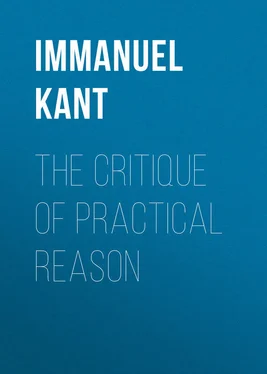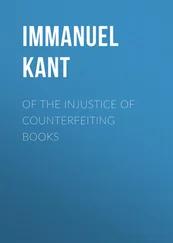Immanuel Kant - The Critique of Practical Reason
Здесь есть возможность читать онлайн «Immanuel Kant - The Critique of Practical Reason» — ознакомительный отрывок электронной книги совершенно бесплатно, а после прочтения отрывка купить полную версию. В некоторых случаях можно слушать аудио, скачать через торрент в формате fb2 и присутствует краткое содержание. Жанр: Философия, foreign_antique, foreign_prose, на английском языке. Описание произведения, (предисловие) а так же отзывы посетителей доступны на портале библиотеки ЛибКат.
- Название:The Critique of Practical Reason
- Автор:
- Жанр:
- Год:неизвестен
- ISBN:нет данных
- Рейтинг книги:5 / 5. Голосов: 1
-
Избранное:Добавить в избранное
- Отзывы:
-
Ваша оценка:
- 100
- 1
- 2
- 3
- 4
- 5
The Critique of Practical Reason: краткое содержание, описание и аннотация
Предлагаем к чтению аннотацию, описание, краткое содержание или предисловие (зависит от того, что написал сам автор книги «The Critique of Practical Reason»). Если вы не нашли необходимую информацию о книге — напишите в комментариях, мы постараемся отыскать её.
The Critique of Practical Reason — читать онлайн ознакомительный отрывок
Ниже представлен текст книги, разбитый по страницам. Система сохранения места последней прочитанной страницы, позволяет с удобством читать онлайн бесплатно книгу «The Critique of Practical Reason», без необходимости каждый раз заново искать на чём Вы остановились. Поставьте закладку, и сможете в любой момент перейти на страницу, на которой закончили чтение.
Интервал:
Закладка:
{PREFACE ^paragraph 20}
When we have to study a particular faculty of the human mind in its sources, its content, and its limits; then from the nature of human knowledge we must begin with its parts, with an accurate and complete exposition of them; complete, namely, so far as is possible in the present state of our knowledge of its elements. But there is another thing to be attended to which is of a more philosophical and architectonic character, namely, to grasp correctly the idea of the whole, and from thence to get a view of all those parts as mutually related by the aid of pure reason, and by means of their derivation from the concept of the whole. This is only possible through the most intimate acquaintance with the system; and those who find the first inquiry too troublesome, and do not think it worth their while to attain such an acquaintance, cannot reach the second stage, namely, the general view, which is a synthetical return to that which had previously been given analytically. It is no wonder then if they find inconsistencies everywhere, although the gaps which these indicate are not in the system itself, but in their own incoherent train of thought.
I have no fear, as regards this treatise, of the reproach that I wish to introduce a new language, since the sort of knowledge here in question has itself somewhat of an everyday character. Nor even in the case of the former critique could this reproach occur to anyone who had thought it through and not merely turned over the leaves. To invent new words where the language has no lack of expressions for given notions is a childish effort to distinguish oneself from the crowd, if not by new and true thoughts, yet by new patches on the old garment. If, therefore, the readers of that work know any more familiar expressions which are as suitable to the thought as those seem to me to be, or if they think they can show the futility of these thoughts themselves and hence that of the expression, they would, in the first case, very much oblige me, for I only desire to be understood: and, in the second case, they would deserve well of philosophy. But, as long as these thoughts stand, I very much doubt that suitable and yet more common expressions for them can be found. 6 6 I am more afraid in the present treatise of occasional misconception in respect of some expressions which I have chosen with the greatest care in order that the notion to which they point may not be missed. Thus, in the table of categories of the Practical reason under the title of Modality, the Permitted, and forbidden (in a practical objective point of view, possible and impossible) have almost the same meaning in common language as the next category, duty and contrary to duty. Here, however, the former means what coincides with, or contradicts, a merely possible practical precept (for example, the solution of all problems of geometry and mechanics); the latter, what is similarly related to a law actually present in the reason; and this distinction is not quite foreign even to common language, although somewhat unusual. For example, it is forbidden to an orator, as such, to forge new words or constructions; in a certain degree this is permitted to a poet; in neither case is there any question of duty. For if anyone chooses to forfeit his reputation as an orator, no one can prevent him. We have here only to do with the distinction of imperatives into problematical, assertorial, and apodeictic. Similarly in the note in which I have pared the moral ideas of practical perfection in different philosophical schools, I have distinguished the idea of wisdom from that of holiness, although I have stated that essentially and objectively they are the same. But in that place I understand by the former only that wisdom to which man (the Stoic) lays claim; therefore I take it subjectively as an attribute alleged to belong to man. (Perhaps the expression virtue, with which also the Stoic made great show, would better mark the characteristic of his school.) The expression of a postulate of pure practical reason might give most occasion to misapprehension in case the reader confounded it with the signification of the postulates in pure mathematics, which carry apodeictic certainty with them. These, however, postulate the possibility of an action, the object of which has been previously recognized a priori in theory as possible, and that with perfect certainty. But the former postulates the possibility of an object itself (God and the immortality of the soul) from apodeictic practical laws, and therefore only for the purposes of a practical reason. This certainty of the postulated possibility then is not at all theoretic, and consequently not apodeictic; that is to say, it is not a known necessity as regards the object, but a necessary supposition as regards the subject, necessary for the obedience to its objective but practical laws. It is, therefore, merely a necessary hypothesis. I could find no better expression for this rational necessity, which is subjective, but yet true and unconditional.
{PREFACE ^paragraph 25}
In this manner, then, the a priori principles of two faculties of the mind, the faculty of cognition and that of desire, would be found and determined as to the conditions, extent, and limits of their use, and thus a sure foundation be paid for a scientific system of philosophy, both theoretic and practical.
Nothing worse could happen to these labours than that anyone should make the unexpected discovery that there neither is, nor can be, any a priori knowledge at all. But there is no danger of this. This would be the same thing as if one sought to prove by reason that there is no reason. For we only say that we know something by reason, when we are conscious that we could have known it, even if it had not been given to us in experience; hence rational knowledge and knowledge a priori are one and the same. It is a clear contradiction to try to extract necessity from a principle of experience (ex pumice aquam), and to try by this to give a judgement true universality (without which there is no rational inference, not even inference from analogy, which is at least a presumed universality and objective necessity). To substitute subjective necessity, that is, custom, for objective, which exists only in a priori judgements, is to deny to reason the power of judging about the object, i.e., of knowing it, and what belongs to it. It implies, for example, that we must not say of something which often or always follows a certain antecedent state that we can conclude from this to that (for this would imply objective necessity and the notion of an a priori connexion), but only that we may expect similar cases (just as animals do), that is that we reject the notion of cause altogether as false and a mere delusion. As to attempting to remedy this want of objective and consequently universal validity by saying that we can see no ground for attributing any other sort of knowledge to other rational beings, if this reasoning were valid, our ignorance would do more for the enlargement of our knowledge than all our meditation. For, then, on this very ground that we have no knowledge of any other rational beings besides man, we should have a right to suppose them to be of the same nature as we know ourselves to be: that is, we should really know them. I omit to mention that universal assent does not prove the objective validity of a judgement (i.e., its validity as a cognition), and although this universal assent should accidentally happen, it could furnish no proof of agreement with the object; on the contrary, it is the objective validity which alone constitutes the basis of a necessary universal consent.
{PREFACE ^paragraph 30}
Hume would be quite satisfied with this system of universal empiricism, for, as is well known, he desired nothing more than that, instead of ascribing any objective meaning to the necessity in the concept of cause, a merely subjective one should be assumed, viz., custom, in order to deny that reason could judge about God, freedom, and immortality; and if once his principles were granted, he was certainly well able to deduce his conclusions therefrom, with all logical coherence. But even Hume did not make his empiricism so universal as to include mathematics. He holds the principles of mathematics to be analytical; and if his were correct, they would certainly be apodeictic also: but we could not infer from this that reason has the faculty of forming apodeictic judgements in philosophy also- that is to say, those which are synthetical judgements, like the judgement of causality. But if we adopt a universal empiricism, then mathematics will be included.
Читать дальшеИнтервал:
Закладка:
Похожие книги на «The Critique of Practical Reason»
Представляем Вашему вниманию похожие книги на «The Critique of Practical Reason» списком для выбора. Мы отобрали схожую по названию и смыслу литературу в надежде предоставить читателям больше вариантов отыскать новые, интересные, ещё непрочитанные произведения.
Обсуждение, отзывы о книге «The Critique of Practical Reason» и просто собственные мнения читателей. Оставьте ваши комментарии, напишите, что Вы думаете о произведении, его смысле или главных героях. Укажите что конкретно понравилось, а что нет, и почему Вы так считаете.












